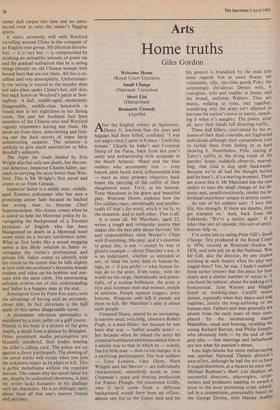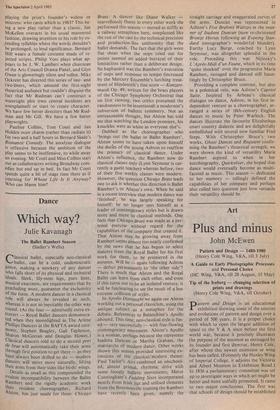Arts
Home truths
Giles Gordon
Welcome Home
(Royal Court Upstairs)
Small Change
(National: Cottesloe)
Short List
(Hampstead)
Romantic Comedy
(Apollo)
Ater the English victory at Agincourt, Henry V, learning that the poys and luggage had been killed, confided: 'I was not angry since I came to France / Until this instant.' Clearly he hadn't met Corporal Sharp of the Paras, back from last year's seedy and embarrassing little escapade in the South Atlantic. Sharp and the four soldiers who accompany him — crop haired, pink faced, hard, influenceable kids — have as their primary objective back home the carrying of the coffin of their slaughtered mate, Terry, at his funeral. Tony Marchant in his grave and beautiful play, Welcome Home, explores how the five soldiers react, emotionally and intellec- tually (if that's the word, which it isn't), to the situation, and to each other. That is all.
It is some all. Mr Marchant, aged 23, writes a tough and vernacular poetry that makes this the best play about Services' life and responsibilities since Wesker's Chips with Everything. His play, and it's essential to grasp this, is not — except by way of ghastly example — about Thatcher's war. It is an indictment, whether so intended or not, of what the army does to human be- ings, or — if you prefer — what human be- ings do to the army. Even today, with the world on the verge, theoretically and poten- tially, of a nuclear holocaust, the army is first and foremost men and women, people in uniform. People squeeze triggers, press buttons. Weapons only kill if people use them to kill. Mr Marchant's play is about such people.
Corporal Sharp, played by an increasing- ly narrow-eyed, twitching, obsessive Robert Pugh, is a mini-Hitler; not because he was born that way — babies usually aren't — but because when he joined the army his corporal humiliated and emasculated him in a similar way to that in which he — scared, fearful little man — does to his charges. It is a terrifying performance. The four soldiers — Tony London, Gary Olsen, Mark Wingett and lan Mercer — are individually characterised, relentlessly acted in John Chapman's spare and riveting production for Paines Plough: the emotional Goldy, who if he'd come from a different background would have been an officer, almost sets fire to the Union Jack and for his gesture is brutalised by the mad (the army regards him as sane) Sharp; the vulnerable, silly, one-time gentle Polo; the surprisingly chivalrous Dennis with, it transpires, wife and toddler at home; and the brutal, unfunny Walters. They are mates, welding us (you, me) together, wondering why the army isn't allowed to become the nation's nurse or nanny, smack- ing it when it's naughty. The police, after all, have their hands full directing traffic.
These dull killers, confronted by the re- mains of their dead comrade, are frightened individuals .although their camaraderie tries to forbid them from feeling or at least showing it. Nonetheless, Polo, staring at Terry's coffin in the living room of his parents' home, suddenly observes, marvel- ling, that God is dog spelt backwards. Because we've all had the thought before and he hasn't, it's a moving moment. There are scores like it. Mr Marchant has the rare ability to take the small change of the de- motic and, unselfconsciously, render the in- dividual experience unique in artistic terms.
As one of his soldiers says: 'I love this life, this strength. If there are doubts, they get stamped on.' And, back from the Falklands: 'We're a nation again.' If it takes that sort of episode, this sort of army, heaven help us.
I've come late to seeing Peter Gill's Small Change, first produced at the Royal Court in 1976, revived at Riverside Studios in 1978, and now put on at the National. Was Mr Gill, also the director, by any chance working at each theatre when his play was staged there? Yes, he was. I hadn't realised from earlier reviews that this piece for four chairs and a similar number of voices is, if you heed the subtext, about the making of a homosexual. June, Watson and Maggie Steed as working-class Cardiff mums almost, especially when they dance and sing together, justify the long-suffering of the human race. Fathers and men generally are absent from the early years of /heir sons, played by the mesmerising James Hazeldine, nasal and braying, recalling the young Richard Burton, and Philip Joseph, who obviously feels — by the end of this grey play — that marriage and fatherhood are not what his passion's about.
Less high-falutin but more embarrassing was another National Theatre director's own effort, although he had the wit to have it staged elsewhere, at a theatre he once ran, Michael Rudman's Short List displays six successful directors, playwrights, script- writers and producers meeting to award a prize to the most promising script submit- ted in a competition, presumably based 011 the George Devine, with Maxine AudleY
playing the prize's founder's widow or mistress: who cares which in 1983? This be- ing a new play rather than a classic, Ian McKellen overacts in his usual mannered fashion, drawing attention to his role by ex- /ending syllables where the words shouldn't be prolonged, to lend significance. Bernard Hill wears a female costume made of re- jected scripts. Philip Voss plays what ap- pears to be J. W. Lambert when chairman of the Arts Council Drama Panel, and Glyn Owen is gloweringly silent and sullen. Mike Ockrent has directed this series of one- and two-liners, which amused the first-night theatrical audience but couldn't disguise the fact that Mr Rudman can't construct a watertight plot (two central incidents are unexplained) or start to create character. We have few better directors than Mr Rud- man and Mr Gill. We have a few better Playwrights.
Pauline Collins, Tom Conti and Jan Holden ooze charm (rather than radiate it) for two and a half hours in Bernard Slade's Romantic Comedy. The anodyne dialogue IS offensive because the ambition of the play seems to be inoffensive, to while away an evening. Mr Conti and Miss Collins start out as collaborators writing Broadway com- edies but end up in bed. In fact Mr Conti spends quite a bit of stage time there as if Yearning for Whose Life Is It Anyway? Who can blame him?







































 Previous page
Previous page